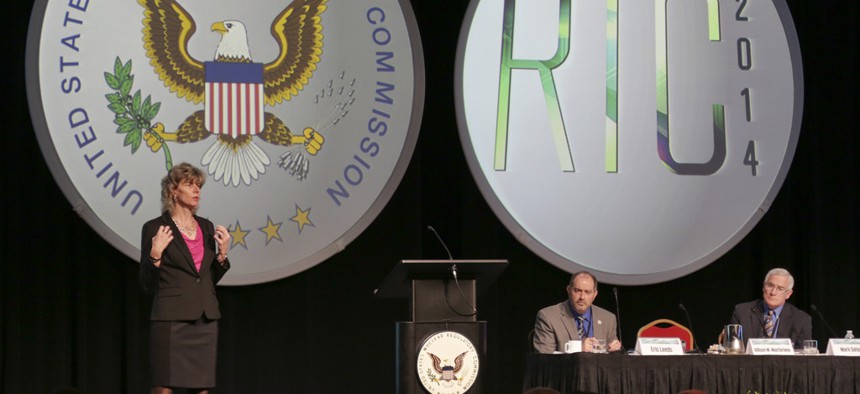
NRC's Allison Macfarlane gives the keynote at the Regulatory Information Conference in March. United States Nuclear Regulatory Commission
Staffers at Nuclear Regulatory Commission Report Backlash After Dissent
Employees say they received poor performance ratings or were passed over for promotions.
Seventy-five percent of Nuclear Regulatory Commission employees who participated in an internal survey said they received poor performance reviews after registering formal objections to agency decisions, a report made public Wednesday says.
For employees that object to policy, technical or administrative statements contained in agency documents working their way up the NRC management chain for approval, the agency has a formal "non-concurrence" process meant to ensure that the concerns of those staffers are heard.
According to the survey, which was conducted last year by the NRC Office of Enforcement, many of those surveyed about their own experience submitting formal objections through the program believed there had been negative consequences to doing so.
In addition to the three quarters of survey participants who reported poor performance reviews after raising objections, 63 percent felt they were excluded from work activities and 25 percent thought they were passed over for promotions.
Meanwhile, 25 percent said they were verbally abused by their supervisors or colleagues after submitting a formal objection, and only 32 percent said their views were fully considered before a decision was made.
The enforcement office report says the NRC inspector general's office was able to substantiate several of the claims of poor performance reviews after raising objections. "Regardless of whether negative consequences actually occurred, staff recognizes that the perception of negative consequences can have a chilling effect on employees and can potentially inhibit them from raising concerns," the report adds.
Speaking at a congressional hearing Wednesday, Senator Edward Markey (D-Mass.) said he was concerned that safety and security issues raised by NRC employees are not being adequately considered as the agency grapples with how to revise its regulations following the onset of the Fukushima disaster in 2011.
"Especially post-Fukushima, it's very important that we get this culture to change," Markey said.
In addition to the survey results, Markey said that, during the past year, his staff "has heard from an increasing number of whistleblowers from many different offices at NRC. … They feel that when they step forward to report safety, security or other problems, they are systematically retaliated against."
The commission made the 2014 report public Wednesday evening after Markey cited it during the morning hearing.
NRC spokesman David McIntyre suggested that not all formal staff objections end badly. He noted that Joseph Giiter, chief of the agency's risk analysis division, filed such an objection to a January NRC staff paper regarding how the agency would handle requests from nuclear power plants looking to have their licenses renewed for a second time.
Giiter still holds his management job after objecting to the official staff position that such aging reactors should not have to conduct new assessments of potential risks associated with their continued operation, McIntyre said.
The commission faced fierce questioning on a number of safety and security issues Wednesday, including on whether it would stop exempting shuttered nuclear power plants from certain emergency-planning and security regulations.
In a letter to commission Chairwoman Allison Macfarlane last month, Senator Barbara Boxer (D-Calif.), Markey and three other senators noted that retired U.S. atomic power plants still have significant amounts of nuclear waste at their sites, and likely will for the foreseeable future.
The senators raised concerns that the commission has already exempted 10 such plants from certain emergency rules and questioned whether it was wise to do so in light of the Fukushima disaster and the threat of terrorism. They noted that the commission is expected in the near future to consider applications for similar exemptions from four additional sites.
One of those sites is the San Onofre nuclear power plant near San Diego, which shut down last year amid concerns that it had been operating with defective parts. During Wednesday's hearing, Boxer read from the facility's exemption request, which she said is seeking to "discontinue off-site emergency planning activities" for the surrounding community and "reduce the scope of onsite emergency planning" at the site itself.
According to Boxer, part of the request is to discontinue evacuation planning for the area. "They're basically asking to be let off the hook," she said.
Boxer's staff held up an aerial photo that showed a recent wildfire coming within a half-mile of the San Onofre site, and the senator raised concerns that future blazes could have catastrophic consequences if they reached the facility.
Reading from a 2003 paper co-authored by Macfarlane and two activists, Boxer said land contamination caused by a fire in a plant's spent fuel pool "could be significantly worse than Chernobyl."
Senator David Vitter (R-La.) sought to put the request in a different light, saying that an operational power plant is a "different animal" than one that has shut down.
For her part, Macfarlane said the commission would not exempt the defunct plant from all emergency planning requirements. But she and the other four presidentially appointed commissioners declined to go any further, saying NRC staff was still studying the request.
During the hearing, Boxer also hammered the commissioners over other recent safety and security decisions. Those included one in which they had elected not to require plant operators to speed up the transfer of nuclear waste from the spent-fuel pools and into dry-cask storage containers, which some experts argue are more secure and less vulnerable to fire. The commission voted 4-1 on the issue, with MacFarlane, a Democrat, casting the lone opposition vote.
The senator also released a legal analysis that she said showed the commission was improperly withholdingdocuments pertaining to the San Onofre plant. The analysis, written by a legal expert formally employed by the Congressional Research Service, seeks to rebut legal arguments made by the agency.
MacFarlane "demonstrates a profound misunderstanding of … Congress’s investigatory power in the … matter; misstates the authority of three cited cases dealing with the law on congressional intercession in agency decisionmaking; ignores the overwhelming contrary case law … that is applicable in this situation; and shows a lack of awareness of over 90 years of congressional investigations in which agencies have been consistently obliged to provide documents and testimony," the report by Morton Rosenberg said.
The analysis also argues that Boxer's Environment & Public Works Committee has authority to obtain the documents through "compulsory process."
According to Boxer, the panel will get the material "one way or another."
NEXT STORY: Is $487K Too Little to Pay Federal Contractors?







